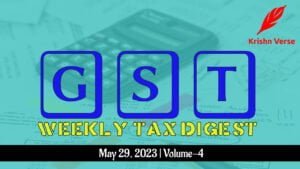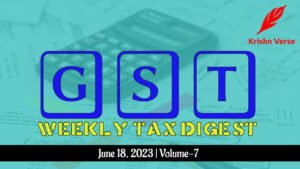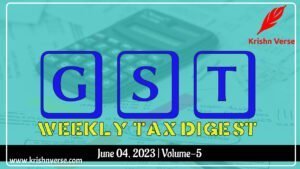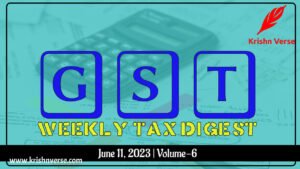Embark on a Journey of Tax Enlightenment with GST Weekly Digest May 2023 Vol-3! Discover the latest tax updates, breaking news, and profound insights that will empower you. This edition delves into diverse topics, including key highlights from GST council meetings, the latest on GST returns, revolutionary e-invoicing updates, and so much more. Stay one step ahead and immerse yourself in our all-inclusive weekly digest to stay informed and empowered!
Digest Period: 14/05/2023 to 20/05/2023
GST – Sunday, 14th May, 2023

Unveiling the Sentinel: Automated GST Scrutiny Flags Data Mismatches, Initiates Notice Protocol
Discover how the central government’s latest move to automate scrutiny of GST returns is set to revolutionize the notice process. With the rollout of an advanced automated scrutiny module, central GST officers will now rely on data analytics and risk identification to initiate scrutiny.
This innovative approach, similar to income tax returns processing, will significantly reduce the need for direct notices from assessment officers. However, as businesses embrace this digital transformation, timely attention to notices arising from data mismatches between GSTR1 and GSTR 3B becomes crucial.
By leveraging data analytics, this new system aims to streamline compliance, enhance ease of doing business, and ensure hassle-free implementation. Join the journey toward simplified GST compliance with fewer physical interactions and a focus on seeking only relevant information for scrutiny.
GST – Monday, 15th May, 2023
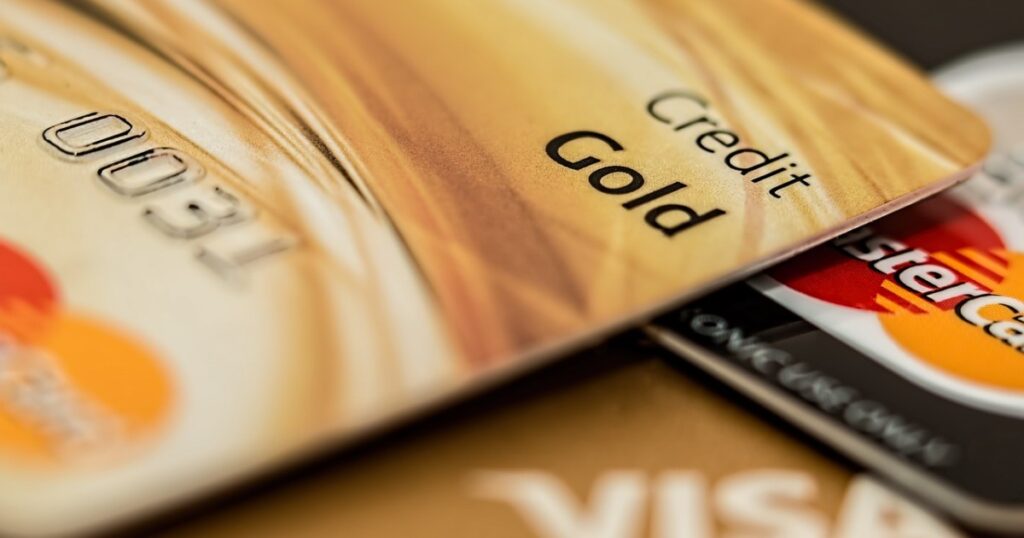
GST Authorities Seek Real-Time Access to Banking Transactions to Counter Tax Evasion
To combat tax evasion and detect fake invoices, Goods and Services Tax (GST) authorities are aiming to acquire near real-time access to taxpayers’ banking transactions. Recent investigations have uncovered the misuse of input tax credit (ITC) through fake invoices, with the accumulated tax credits being utilized for illicit hawala transactions.
The authorities plan to obtain faster access to banking data, similar to the income tax department, which monitors high-value and suspicious transactions.
Additionally, GST authorities intend to expand their risk parameters by incorporating databases such as provident fund data, customs records, railway data, and Panchayati Raj data to identify potential tax evaders and ensure proper tax compliance. These efforts align with the ongoing drive to reduce fake invoicing and expand the taxpayer base in the GST system.

NBFC Association Urges RBI to Reconsider Categorizing Penal Interest as ‘Charges’ to Avoid Tax Implications
The Finance Industry Development Council (FIDC), which represents non-banking financial companies in India, has asked the Reserve Bank of India (RBI) not to categorize penal interest as ‘charges’ because it could have tax implications.
The FIDC is concerned about the RBI’s guidelines on fair lending practices, which require clear disclosure of penal interest or charges. They believe that classifying penal interest as charges may lead to additional difficulties, such as imposing goods and services tax (GST) on the penal charges, which could further burden customers who are already unable to repay their loans.
The FIDC argues that penal interest serves as a deterrent for borrowers who fail to comply with loan repayment terms. They suggest that instead of considering penal interest as charges, it would be more appropriate to adjust the credit risk premium when there is a significant improvement in the borrower’s risk profile. Penal interest, on the other hand, should be charged from the date of default to discourage unnecessary delays in repayment.
Congress’ Victory in Karnataka Set to Shake Up GST Rate Restructuring
The return of the Congress party to power in Karnataka is expected to have an unusual impact on the restructuring of GST rates. The rate rationalization panel, led by the Chief Minister of Karnataka, will undergo changes, causing delays in finalizing the report.
With upcoming elections in multiple states, there is limited political will to make decisions on rate rationalization. Even if the final report is presented, it may not be immediately implemented due to concerns about potential price increases.
The Congress party has called for a simplified GST with fewer tax slabs, while former Finance Minister Chidambaram has criticized the current system. However, given inflationary pressures and the desire for higher revenue, significant changes to the GST rates are unlikely in the near future.
GST – Tuesday, 16th May, 2023
File GSTR-9 and GSTR-9C for FY 2022-23 Now!
Important update! The GSTN has now made it available to file your Annual Return and Reconciliation Statement for the financial year 2022-2023. Simply head to the GST portal and file your GSTR-9 and GSTR-9C forms.
Remember, the deadline to file these forms for the financial year 2022-2023 is December 31, 2023. Take advantage of this option and ensure you meet your tax filing requirements on time.
GST – Wednesday, 17th May, 2023

GST Investigation Expands to Insurance Companies, Notices to Be Sent to 10 More Firms Soon
The goods and services tax department has extended its investigation into insurance companies for suspected improper use of input tax credit. The Director General of GST Intelligence plans to issue show cause notices to 10 additional insurers, bringing the total number under scrutiny to 30.
The investigations, led by the Mumbai, Meerut, and Gurugram zonal offices of the DGGI, have uncovered a total tax evasion of Rs 2,500 crore. So far, the companies have voluntarily paid around Rs 750 crore. The probe began in 2022 when it was discovered that insurers were wrongfully claiming input tax credit based on invoices from intermediaries, bypassing IRDAI regulations.
This industry-wide issue has prompted both the GST and income tax departments to initiate investigations. While some insurers have requested the involvement of the insurance regulator IRDAI, officials believe that the matter falls under the jurisdiction of the Central Board of Indirect Taxes and Customs. The implementation of new IRDAI rules is expected to help address the problem by setting limits on management expenses for insurance companies.

Proposals Sent to Reduce GST Rates for Leather Sector, Says DPIIT
The Department for Promotion of Industry and Internal Trade (DPIIT) has acknowledged the GST challenges faced by the leather sector and has forwarded proposals to the Finance Ministry for rate reductions. However, any changes to the GST rates for leather goods require approval from the GST Council, according to Rajeev Singh Thakur, additional secretary at DPIIT.
The leather industry has been advocating for a reduction in GST from 12% to 5%. Additionally, exporters of leather products have expressed discontent over the increase in GST from 5% to 12% for finished leather.
Thakur mentioned that around Rs 350 crore has been disbursed under the Indian Footwear and Leather Development Programme (IFLDP) out of the allocated Rs 1,700 crore until FY26.
The implementation of IFLDP includes various sub-schemes such as Integrated Development of Leather Sector (IDLS), Sustainable Technology and Environmental Promotion (STEP), Establishment of Institutional Facilities (EIF), Mega Leather Footwear and Accessories Cluster Development (MLFAC), Brand Promotion, and Development of Design Studios.
Proposals for MLFAC have been received from Bihar, Madhya Pradesh, Uttar Pradesh, Maharashtra, Tamil Nadu, and Manipur. These proposals are currently under scrutiny by the National Productivity Council (NPC) and are expected to be considered soon. The main challenge in establishing such clusters lies in acquiring land clearance from state governments, added Singh. The leather sector employs approximately 4.42 million individuals, predominantly women and individuals from economically weaker sections of society.
The industry is predominantly comprised of small and medium-sized family-oriented businesses. The Indian footwear market experienced consistent growth of 13% from 2015 to 2019, but faced a sharp decline in 2020-21 due to the impact of Covid-19. However, in FY22, it witnessed a growth of 20% compared to FY21, as reported by DPIIT.
GST – Thursday, 18th May, 2023

Law Firms Appeal to Maintain Current GST Regime for Online Gaming Industry
Several prominent law firms representing the gaming industry have reached out to the Prime Minister’s Office (PMO), urging the GST Council to retain the existing tax structure for the online gaming sector.
Currently, online skill gaming operators pay a GST rate of 18% on the platform or service fee deducted from the total entry fee paid by players. However, there is a proposal to increase this rate to 28%, calculated on the total amount of money paid by players.
In response, the law firms argue that raising the GST rate to 28% on the winnings pool, along with commission fees for skill-based games, would equate skill-based games with games of chance. Over the years, various courts, including the Supreme Court of India, have ruled that skill-based games should not be treated in the same manner as lottery, betting, or gambling. This distinction is also reflected in the IT Rules of 2023.
The Bombay High Court has already determined that these companies should be subject to an 18% tax rate under the GST Act. Imposing a uniform rate of 28% for both skill-based and chance-based games would violate the principle of equality enshrined in Article 14 of the Constitution of India. The law firms have pointed out that “Rule 31A of the CGST Rules, 2018” governs the valuation of supply for GST calculation in the case of lottery, betting, gambling, and horse racing.
It imposes a 28% GST rate on the amount deposited or bet on the outcome of the service. Games of skill that do not fall under the purview of Rule 31A should be exempt from this provision and not subject to GST on the entire amount deposited by users.

Find Your Invoice Reference Number (IRN) with Ease: A New Feature by GSTN
In a welcome move, the Goods and Services Tax Network (GSTN) has introduced a user-friendly feature that allows you to retrieve the Invoice Reference Number (IRN) for any invoice, credit note, or debit note, even if you forgot to save it. Now, finding the IRN is just a few simple steps away.
To access this convenient functionality, follow these steps:
1. Visit the GSTN Dashboard at https://einvoice.gst.gov.in/einvoice/dashboard.
2. Navigate to the “Search/Enable” section.
3. Click on the “Search IRNs” option.
By utilizing this feature, you can effortlessly locate the IRN associated with your invoice or other documents. It ensures that you no longer have to worry about losing track of important information.
Whether you need the IRN for record-keeping purposes, reconciliation, or any other requirement, this innovative solution by GSTN simplifies the process, saving you time and effort.
Embrace this new feature and experience the convenience of retrieving your Invoice Reference Numbers hassle-free. Stay organized and stay on top of your GST compliance with ease.
GST – Friday, 19th May, 2023

Call for Action: FADA Urges GST Council to Cut Two-Wheeler GST Rates
The Federation of Automobile Dealers Associations (FADA) has made a compelling appeal to the GST council, seeking an immediate reduction in the GST rate on two-wheelers from 28% to 18%. FADA emphasizes that this intervention is crucial to make two-wheelers more affordable, revive demand, and rejuvenate an industry that has witnessed a significant sales decline in recent years.
Highlighting the impact of rising prices, FADA has forwarded its request for GST rate reduction to key stakeholders, including the Finance Minister, the GST Council, the Ministry of Heavy Industries, and the Ministry of Road Transport & Highways. The continuous price hike of two-wheelers due to factors such as increased raw material costs, stricter emission norms, and higher taxes has significantly affected affordability for consumers nationwide.
FADA underlines that the escalating prices have resulted in a sales decline, causing two-wheelers’ contribution to the total automobile sales to decrease from 78% in 2016 to 72% in 2023. By addressing critical industry challenges like rural distress, BS-4 to BS-6 transition, and soaring prices, FADA believes that reducing the GST rate will enhance competitiveness, boost sales, and generate higher revenue for the industry.
Moreover, FADA highlights the positive environmental impact of lower GST rates on two-wheelers, as they are fuel-efficient and emit fewer pollutants compared to other modes of transportation. Join FADA in advocating for a reduction in GST rates on two-wheelers, ensuring affordability, sustainability, and a thriving industry.
GST – Saturday, 20th May, 2023

Important Update: 18% GST Applicable on Sale of Open Car Parks, says AAAR
In a recent ruling, the West Bengal bench of the Appellate Authority of Advance Rulings (AAAR) has confirmed that the sale or right to use a car park is not inherently bundled with construction services. As a result, it will be treated as a separate supply and attract a higher GST rate of 18%. This decision came in response to an appeal by Eden Real Estates, a residential apartment construction company.
Since April 1, 2019, non-affordable housing projects are subject to 5% GST without input tax credit. However, for ongoing projects like this one, builders have the option to pay GST at the previous rate of 12% with ITC, allowing them to offset taxes paid on inputs. If the AAAR had considered the car park transaction as a composite supply, the applicable GST rate would have been that of the primary supply of construction, which is lower.
The real estate developer argued that the car parking space is exclusively provided to flat buyers, and stamp duty is paid on the entire consideration. However, the AAAR bench noted that flat buyers may choose not to opt for a car parking space when booking their flat. Therefore, the contention that the right to use an open parking space is naturally bundled with construction services and constitutes a composite supply was deemed invalid.
Stay informed about the latest updates: 18% GST is now applicable on the sale of open car parks, as ruled by the AAAR.
Frequently Asked Questions (FAQ)
What is the new automated scrutiny module for GST returns?
The central government has introduced an advanced automated scrutiny module for GST returns. This module utilizes data analytics and risk identification to initiate scrutiny, reducing the need for direct notices from assessment officers.
Why are GST authorities seeking real-time access to banking transactions?
To counter tax evasion and detect fake invoices, GST authorities are aiming to acquire near real-time access to taxpayers’ banking transactions. This move is intended to identify misuse of input tax credit (ITC) and curb illicit transactions facilitated through accumulated tax credits.
Why is the Finance Industry Development Council (FIDC) urging the RBI to reconsider categorizing penal interest as ‘charges’?
The FIDC is concerned about the tax implications that may arise if penal interest is categorized as ‘charges’ by the RBI. They argue that imposing GST on penal charges would burden customers who are already struggling with loan repayments.
How does the return of the Congress party in Karnataka affect the restructuring of GST rates?
The return of the Congress party in Karnataka is expected to cause delays in the restructuring of GST rates. The rate rationalization panel, led by the Chief Minister of Karnataka, may undergo changes, and decisions on rate rationalization are unlikely to be made immediately due to upcoming elections and concerns about potential price increases.
How can users retrieve the Invoice Reference Number (IRN) for GST invoices?
The Goods and Services Tax Network (GSTN) has introduced a user-friendly feature that allows users to retrieve the Invoice Reference Number (IRN) for any GST invoice, credit note, or debit note. Users can access this feature through the GSTN Dashboard and easily locate the IRN associated with their documents.
Disclaimer
We strive to provide you with accurate, reliable, and up-to-date information sourced from credible resources. We take utmost care in our research and presentation. However, it is important to note that information can evolve and change over time, and there is a possibility that some details may have been missed or altered since the time of publication.
We sincerely apologize for any errors or omissions that may have inadvertently occurred despite our best efforts. This article is intended for informational purposes only and should not be considered as professional advice. It is highly recommended that you seek professional assistance and conduct your own research before making any decisions based on the information presented here.
We appreciate your understanding and encourage you to stay informed through multiple sources for a comprehensive understanding of the subject matter.
For more details on GST you may visit either of the website Press Information Bureau or Goods and Service Tax
Explore more details and articles related to Taxation News and Updates on our dedicated page created for the purpose. Click Here

